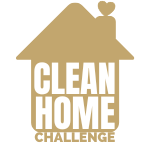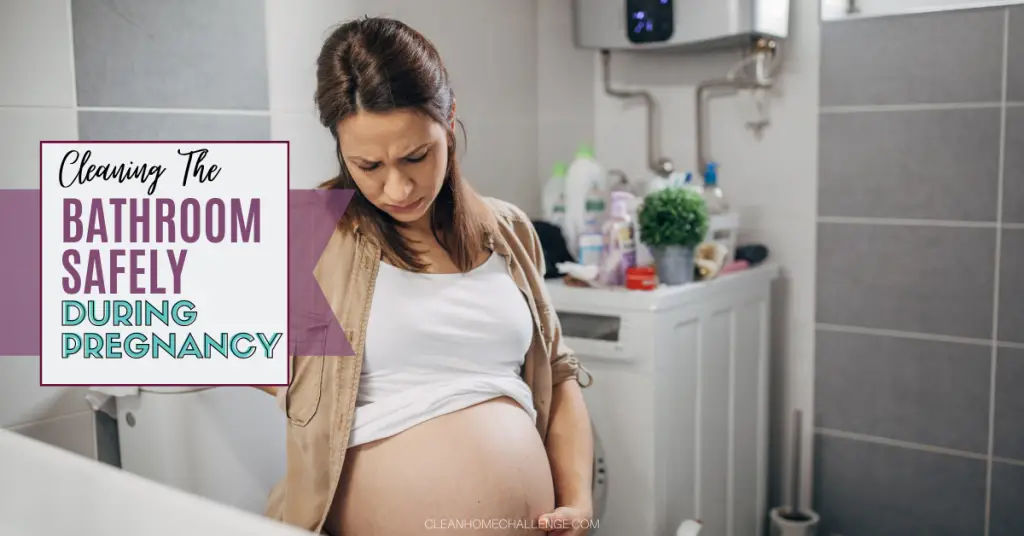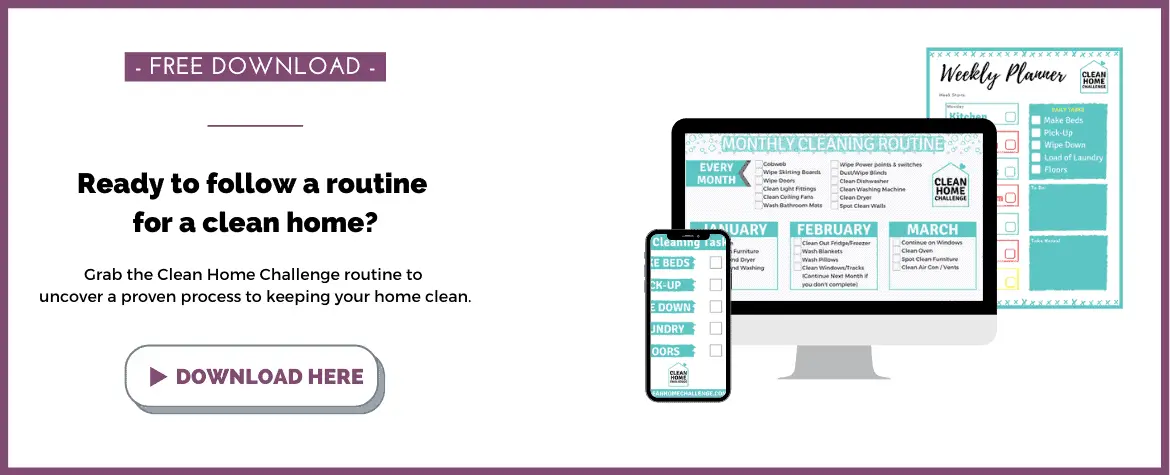THIS POST MAY CONTAIN AFFILIATE LINKS. PLEASE READ MY DISCLOSURE FOR MORE INFO.
It is generally safe to clean the bathroom while pregnant, but there are some precautions you should take to minimize your exposure to harmful chemicals and reduce your risk of injury.
Here are some quick tips:
- Use natural cleaning products: Avoid harsh chemicals and opt for natural cleaning products that are safe for you and your developing baby.
- Wear gloves: Wear gloves to protect your hands from harsh chemicals and bacteria.
- Ventilate the bathroom: Open windows or turn on the exhaust fan to ensure proper ventilation while cleaning.
- Avoid heavy lifting: Avoid lifting heavy objects, such as buckets of water or large cleaning supplies, as this can strain your back and cause injury.
- Take breaks: Take frequent breaks and stay hydrated to prevent fatigue and overheating.
If you have any concerns or questions about cleaning while pregnant, it is always best to consult with your healthcare provider.
Benefits of a Clean Bathroom During Pregnancy
Maintaining a clean and hygienic bathroom environment is important for everyone, but it is especially crucial during pregnancy. Here are some of the benefits of a clean bathroom during pregnancy:
- Reduces the risk of infections: A clean bathroom reduces the risk of infections such as urinary tract infections (UTIs) and bacterial vaginosis (BV), which are more common during pregnancy. These infections can be harmful to the developing fetus and may cause complications.
- Prevents the spread of germs: A clean bathroom helps prevent the spread of germs and bacteria that can cause illnesses such as colds and flu. Pregnant women are more susceptible to these illnesses due to changes in their immune system.
- Improves air quality: A clean bathroom improves air quality by reducing the buildup of mold, mildew, and other allergens that can trigger respiratory problems such as asthma and allergies.
- Reduces stress: A clean and organized bathroom can help reduce stress and promote relaxation during pregnancy. This is important for both the mother and the developing fetus.
- Promotes a healthy environment: A clean bathroom promotes a healthy environment for the mother and the developing fetus. This is important for the overall health and well-being of both.
Maintaining a clean and hygienic bathroom environment is essential during pregnancy. It helps reduce the risk of infections, prevents the spread of germs, improves air quality, reduces stress, and promotes a healthy environment for the mother and the developing fetus.
Safe Bathroom Cleaning Practices for Pregnant Individuals
Safe cleaning practices are essential for pregnant individuals to protect both themselves and their developing babies. Here are some tips to ensure safe cleaning practices during pregnancy:
- Proper ventilation: It is important to ensure proper ventilation while cleaning to avoid inhaling harmful chemicals and fumes. Open windows or turn on the exhaust fan to improve air circulation.
- Use gloves and comfortable clothing: Wearing gloves and comfortable clothing during cleaning sessions can help prevent skin irritation and reduce the risk of injury. Gloves can also protect your hands from harsh chemicals.
- Take breaks and stay hydrated: Cleaning can be physically demanding, so it is important to take frequent breaks and stay hydrated to prevent fatigue and discomfort. Drink plenty of water and take rest breaks as needed.
- Avoid heavy lifting: Avoid lifting heavy objects such as buckets of water or large cleaning supplies, as this can strain your back and cause injury. Use lightweight cleaning tools and equipment to reduce the risk of injury.
- Use natural cleaning products: Harsh chemicals found in some cleaning products can be harmful to pregnant individuals and their developing babies. Consider using natural cleaning products that are safe for both you and your baby.
- Avoid cleaning pet litter: Pregnant individuals should avoid cleaning pet litter, as it can contain harmful bacteria that can cause infections such as toxoplasmosis. Ask someone else to clean the litter box or wear gloves and a mask if you must do it yourself.
Safe cleaning practices are essential for pregnant individuals to protect themselves and their developing babies. Proper ventilation, wearing gloves and comfortable clothing, taking breaks and staying hydrated, avoiding heavy lifting, using natural cleaning products, and avoiding cleaning pet litter are all important aspects of safe cleaning practices during pregnancy.
Essential Cleaning Supplies and Products
Essential cleaning supplies and products for pregnant individuals should be safe for both the mother and the developing baby. This includes non-toxic and natural alternatives, mild cleaning agents, and reusable cleaning tools.
- Pregnancy-safe cleaning products: Pregnant individuals should avoid using harsh chemicals found in some cleaning products, as they can be harmful to both the mother and the developing baby. Instead, consider using non-toxic, natural alternatives such as vinegar, baking soda, and lemon juice. These natural cleaning agents are effective at cleaning and disinfecting and are safe for use during pregnancy.
- Mild and effective cleaning agents: When cleaning different surfaces in the home, it is important to use mild and effective cleaning agents that are safe for both the mother and the baby. For example, a mixture of mild dish soap and warm water can be used to clean floors, while a mixture of vinegar and water can be used to clean windows and mirrors. It is important to read the labels on cleaning products to ensure they are safe for use during pregnancy.
- Benefits of microfiber cloths and reusable cleaning tools: Microfiber cloths are a great option for cleaning during pregnancy, as they are gentle on surfaces and do not require harsh chemicals to be effective. Additionally, reusable cleaning tools such as mops and dusters can be a good alternative to disposable cleaning supplies, as they are more environmentally friendly and can be washed and reused.
Pregnant individuals should prioritize using safe and effective cleaning supplies and products during cleaning activities. Non-toxic, natural alternatives such as vinegar, baking soda, and lemon juice can be effective at cleaning and disinfecting, while mild cleaning agents such as dish soap and warm water can be used on different surfaces. Microfiber cloths and reusable cleaning tools can also be beneficial during pregnancy, as they are gentle on surfaces and more environmentally friendly.
Step-by-Step Guide to Cleaning the Bathroom While Pregnant
It’s important to prioritize your well-being while cleaning, especially during this time. Here’s a step-by-step guide to help you clean your bathroom safely and efficiently:
- Gather Your Supplies: Before you start, make sure you have all your cleaning supplies ready. This prevents unnecessary trips back and forth.
- Ventilation: Open windows and doors for proper ventilation. This helps to reduce exposure to cleaning chemicals.
- Toilet Cleaning:
- Start with the toilet. Use a toilet bowl cleaner that is safe for pregnancy.
- Apply the cleaner inside the bowl and let it sit for a few minutes.
- Use a toilet brush to scrub the bowl, focusing on the rim and under the seat.
- Wipe down the exterior of the toilet with a mild all-purpose cleaner.
- Sink Cleaning:
- Wipe down the sink and countertop using a gentle cleaner.
- Pay attention to faucets and handles, as these can harbor germs.
- Use an old toothbrush to clean around the faucet and drain area.
- Shower/Bathtub Cleaning:
- For the shower or bathtub, choose a pregnancy-safe bathroom cleaner.
- Spray the cleaner on tiles, grout, and the tub surface.
- Let it sit for a few minutes to loosen soap scum and grime.
- Scrub the surfaces using a non-abrasive brush or sponge.
- Rinse thoroughly with water to remove any cleaning residue.
- Mirror Cleaning:
- Mix equal parts water and white vinegar in a spray bottle.
- Spray the solution on the mirrors and wipe them clean with a microfiber cloth.
- Mold and Mildew:
- If you encounter mold or mildew, consider wearing gloves and a mask for added protection.
- Use a mold and mildew cleaner to treat affected areas. Ensure proper ventilation during this process.
- Finishing Touches:
- Wipe down all surfaces you’ve cleaned to remove any cleaning residue.
- Empty trash bins and replace liners.
- Wash your hands thoroughly after cleaning.
Remember, safety is key during pregnancy. Opt for natural, non-toxic cleaning products, and take breaks as needed. If you’re ever unsure about a cleaning product’s safety, consult your healthcare provider.
Chemicals to Avoid During Pregnancy
Maintaining a clean and safe bathroom environment during pregnancy is crucial. Let’s delve into the topic of cleaning chemicals to avoid during pregnancy, especially when it comes to cleaning your bathroom.
Common Household Cleaning Chemicals to Steer Clear Of:
- Bleach: Bleach contains strong fumes and can lead to respiratory irritation. Direct contact with skin or accidental ingestion can also cause harm.
- Ammonia: Found in glass and window cleaners, ammonia can be harmful if inhaled or if it comes into contact with skin. It can cause respiratory issues and irritation.
- Phthalates: These are often found in fragranced products like air fresheners and some detergents. Phthalates can disrupt hormonal balance and have been associated with developmental issues.
- Formaldehyde: Present in some cleaning products, formaldehyde is a known carcinogen and can cause skin and respiratory irritation.
- Volatile Organic Compounds (VOCs): Found in many cleaning products, VOCs can lead to indoor air pollution and may cause irritation or exacerbate existing respiratory conditions.
Potential Risks of Exposure to Certain Chemicals While Pregnant:
Exposure to these chemicals during pregnancy can potentially harm both the developing fetus and the mother. Risks include:
- Respiratory Irritation: Fumes from certain cleaning products can cause respiratory discomfort, which can be particularly challenging for pregnant individuals who might already experience shortness of breath.
- Skin Sensitivity: Hormonal changes during pregnancy can make the skin more sensitive. Contact with certain chemicals can lead to skin irritation or allergic reactions.
- Developmental Concerns: Some chemicals, like phthalates and formaldehyde, are linked to developmental issues in fetuses.
- Hormonal Disruption: Exposure to certain chemicals can disrupt the delicate hormonal balance during pregnancy, potentially affecting the health of both the mother and the baby.
Encouraging the Use of Natural and Pregnancy-Friendly Alternatives:
Opting for natural and pregnancy-friendly alternatives is a great way to ensure a safe and clean bathroom environment. Consider these options:
- Vinegar and Water: A mixture of white vinegar and water can effectively clean surfaces. Vinegar is safe and has antibacterial properties.
- Baking Soda: Baking soda is a gentle abrasive that can be used to clean and scrub surfaces.
- Castile Soap: This plant-based soap is safe and versatile for cleaning various surfaces.
- Essential Oils: Certain essential oils like tea tree, lavender, and lemon have natural cleaning properties and can be added to your homemade cleaning solutions.
Remember, proper ventilation is key when cleaning any space. Open windows and doors to allow fresh air to circulate, and consider wearing gloves and a mask if you’re using any cleaning agents, even natural ones.
Times When You Shouldn’t Clean the Bathroom During Pregnancy
It’s important for pregnant individuals to prioritize their health and well-being while cleaning the bathroom. There are several instances when it’s advisable to avoid cleaning the bathroom to ensure the safety of both the expecting parent and the unborn child.
- Harsh Chemical Exposure: Pregnant individuals should steer clear of using strong cleaning chemicals, as these can release harmful fumes that may negatively affect their health and that of the baby. Bleach, ammonia, and other strong cleaning agents should be avoided or used with extreme caution.
- Physical Strain: Cleaning tasks that involve heavy lifting, excessive bending, or stretching can put undue strain on the body, especially during pregnancy. These actions can lead to back pain, muscle strain, and discomfort. It’s recommended to avoid tasks like moving heavy furniture or lifting heavy containers of cleaning supplies.
- Standing for Prolonged Periods: Standing for extended periods can lead to fatigue, swollen feet, and backaches. Cleaning tasks that require prolonged standing, such as scrubbing floors or walls, should be minimized or avoided altogether.
- Excessive Bending and Stretching: Pregnancy changes the body’s center of gravity, making movements that involve bending and stretching more challenging and potentially risky. Tasks like scrubbing the bathtub or reaching high shelves should be approached with caution.
- Slip and Fall Hazards: Bathrooms are often wet and slippery environments, increasing the risk of slips and falls. Pregnant individuals should avoid cleaning tasks that require walking on wet surfaces or using step stools, as these activities can lead to accidents.
- Mold and Mildew Removal: While mold and mildew should be addressed promptly, the process of scrubbing these substances can release spores into the air, potentially causing respiratory issues. It’s advisable to delegate this task to a family member or seek professional help.
- Heavy-Duty Cleaning Tasks: Tasks that involve intense scrubbing or require prolonged periods of exertion, such as deep grout cleaning or heavy-duty scrubbing of surfaces, should be avoided due to the physical strain they can place on the body.
Given these potential risks and challenges, it’s highly recommended that pregnant individuals seek assistance from family members, friends, or professionals when it comes to cleaning the bathroom. Delegating tasks that pose health risks or physical strain can help ensure a safer and healthier pregnancy. Remember, it’s perfectly acceptable to ask for help and prioritize your well-being during this special time.
Seeking Help and Joining the Cleaners Clubhouse
When it comes to cleaning the bathroom during your pregnancy, it’s essential to prioritize your health and well-being. Seeking help is a smart choice, especially when you’re balancing pregnancy with the demands of a busy household. This is where the Cleaners Clubhouse comes in as a valuable resource for individuals like you.
The Cleaners Clubhouse is a fantastic community designed to support busy families who strive to maintain a clean and organized home. As someone who values a clean living space and is navigating the challenges of pregnancy, you’ll find the Clubhouse to be an ideal place to connect with like-minded individuals who understand your situation.
Inside the Cleaners Clubhouse, you’ll gain access to a wealth of resources tailored to your needs. One of the standout features is the monthly cleaning routine that’s thoughtfully crafted to fit into your busy schedule. This routine takes into consideration your specific circumstances and provides a structured plan to help you maintain a clean home without overwhelming yourself.
But that’s not all – the Cleaners Clubhouse offers a treasure trove of hints, tips, and printable checklists for all your home cleaning tasks, including bathroom cleaning. These resources are designed to streamline your cleaning process and make it more efficient, allowing you to spend less time worrying about chores and more time focusing on your well-being and the upcoming arrival of your little one.
Joining the Cleaners Clubhouse is an excellent decision for anyone seeking guidance, support, and camaraderie during their cleaning journey, especially if you’re pregnant and managing a busy household. You’ll be able to connect with others who are in similar situations and exchange valuable insights, tips, and experiences.
So, why wait? Embark on this journey towards a cleaner and more organized home, all while taking care of yourself and your growing family. Join the Cleaners Clubhouse today by visiting www.cleanersclubhouse.com. Together, we can make the process of maintaining a clean home a much more enjoyable and manageable experience.


